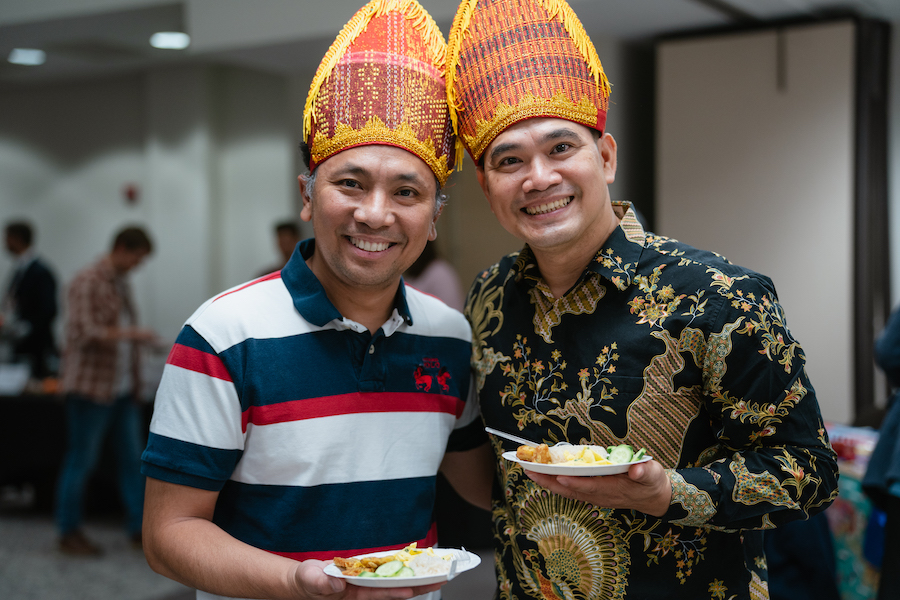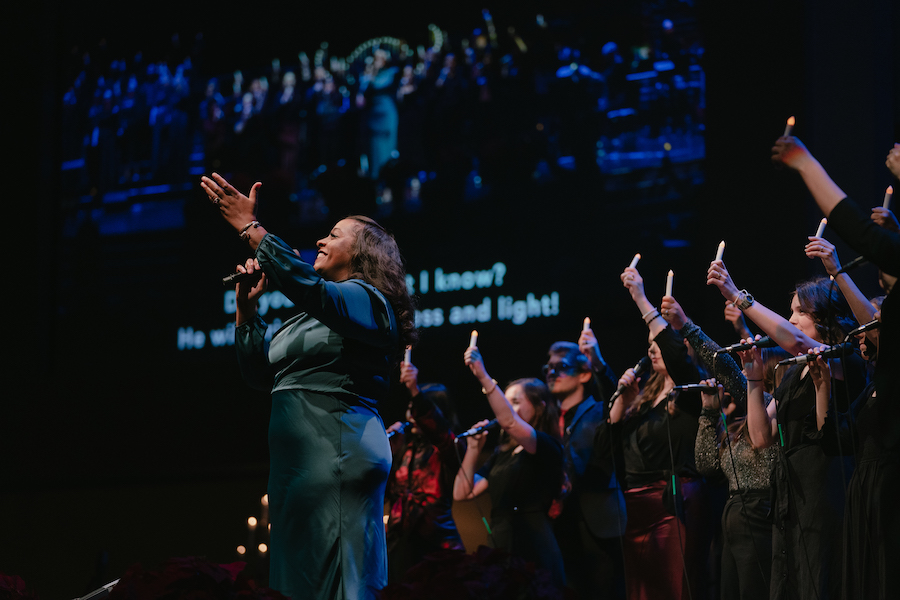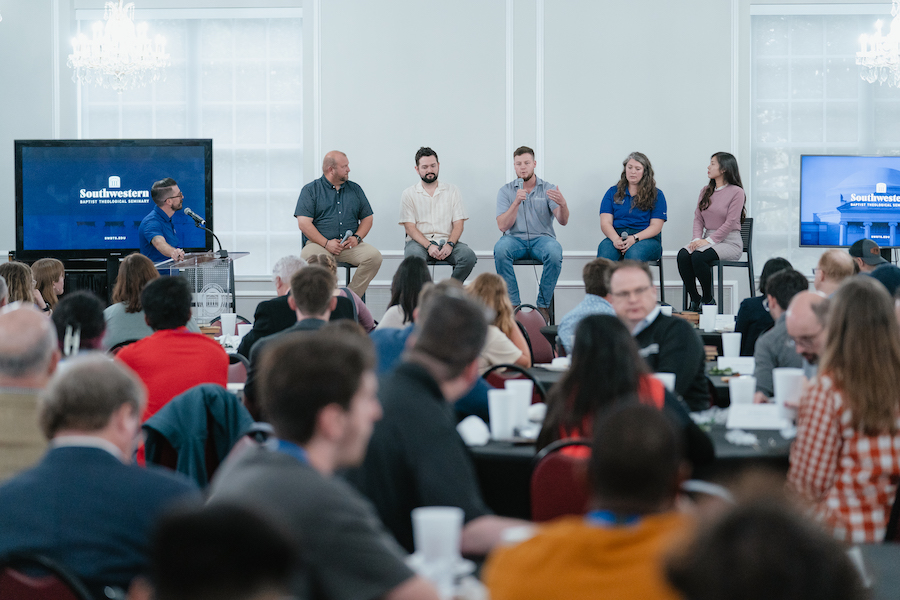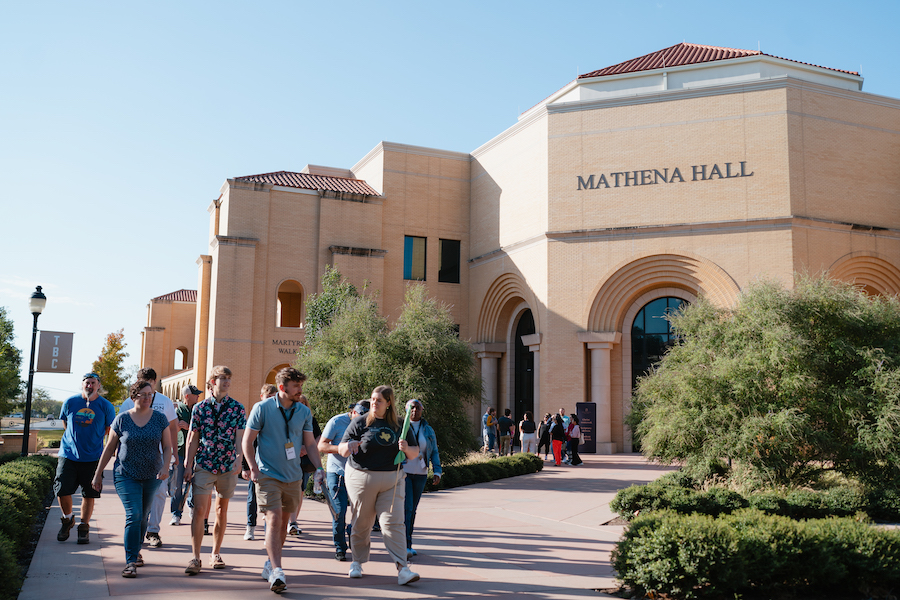Dockery says ‘confessionally guided’ provides ‘hermeneutical lens’ to Southwestern’s core values
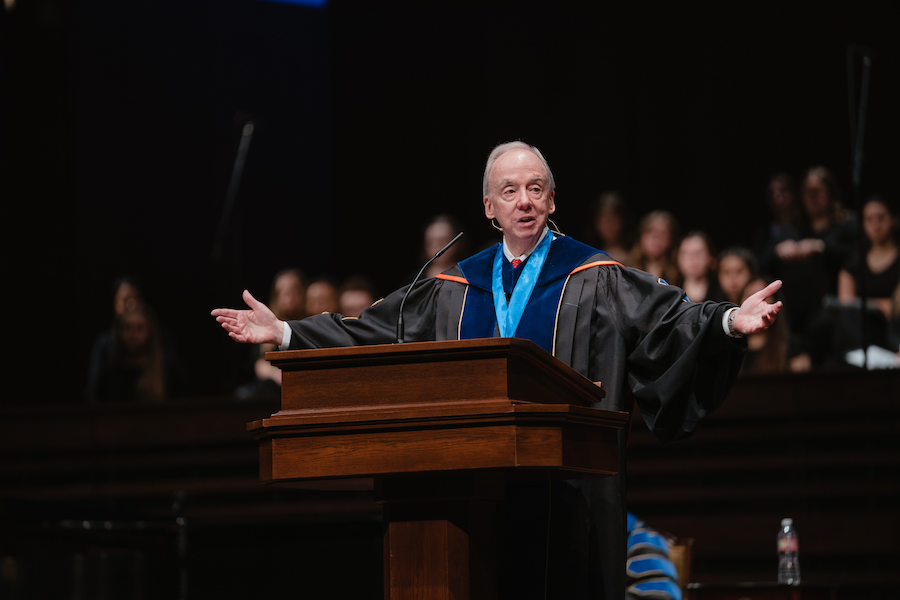
Explaining the history of confessional statements and how the core value of “confessionally guided” shapes the classroom and community of Southwestern Baptist Theological Seminary, President David S. Dockery encouraged students, faculty, and staff to understand the “hermeneutical lens” of the institution’s fourth core value during the Jan. 23 convocation service to begin the academic semester.
The service also included the installation of four administrators and the introduction of one new faculty member.
Before delivering his convocation address, Dockery noted the “wonderful spirit” across the campus as new student enrollment for the spring 2024 semester has increased “over 11 percent from last spring” and the “significant” increase in credit hours taught for the academic semester.
In a tradition that dates to Southwestern Seminary’s fifth president, Robert E. Naylor, Dockery, the institution’s tenth president, recognized new students as “Southwesterners” who join more than 40,000 other individuals trained on Seminary Hill who serve the world over as pastors, missionaries, church staff, and denominational employees, among others.
“I want to try to answer the question why we have a statement of faith, why it is important to us [and] what this statement means for our entire community – faculty, staff, and student together,” Dockery explained. “We’ll do so because this core value runs the risk not so much of being misunderstood, but being underappreciated, often thought of as being only applied to those who teach in a certain subject matter or being relegated to the idea that it only means that Southwestern is merely a Baptist institution.”
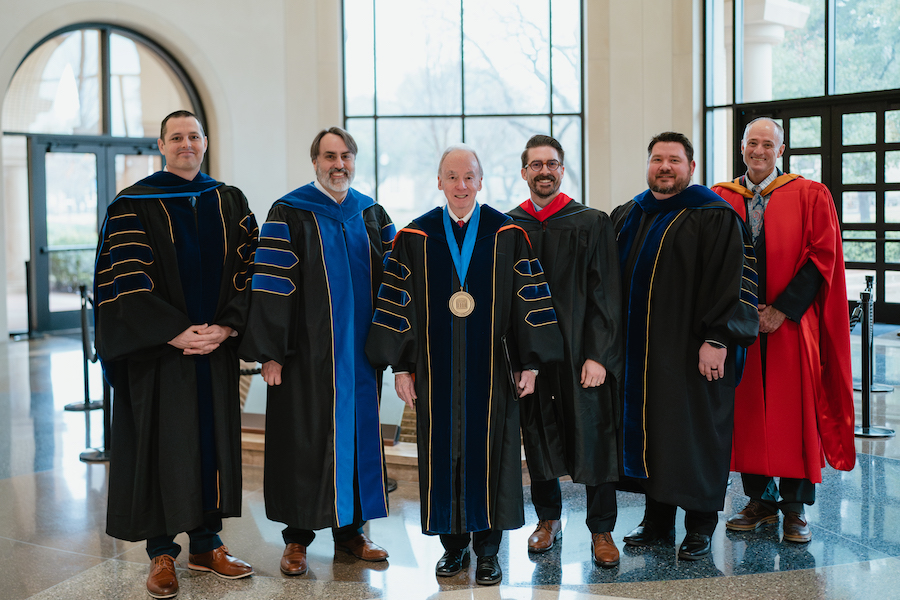
During the Jan. 23 convocation service at Southwestern Baptist Theological Seminary, President David S. Dockery oversaw the installations of one academic chair and three vice presidents, including Dean Sieberhagen, interim dean of the Roy J. Fish School of Evangelism and Missions, to the Charles F. Stanley Chair for the Advancement of Global Christianity; Travis Trawick, assistant professor of theology, as vice president for institutional effectiveness and strategy; R. Adam Dodd, assistant professor of Old Testament and biblical backgrounds, as vice president for campus technology; and Chandler Snyder, instructor of missions, as vice president for enrollment and student services and dean of students. W. Madison Grace II, provost and vice president for academic administration, introduced Kevin Rodgers as associate professor of intercultural studies at Texas Baptist College. Rogers will be on campus in the fall.
Southwestern Seminary’s six core values, grace filled, Christ centered, scripturally grounded, confessionally guided, student focused, and globally engaged, were introduced in January 2023 and approved by the institution’s board of trustees in April 2023 as part of the seminary’s “Advance Southwestern: 2030” institutional plan.
Acknowledging that Southwestern is “certainly a Baptist institution,” Dockery said he believed it is “important to note not only what this core value means, but what it also does not mean.” He harkened to the words of the late Leon McBeth, distinguished professor of church history, who “observed” the two noticeable ways Baptists have used confessional statements, notably “to proclaim Baptist distinctives” and “to show how similar Baptists are to other Christians.”
Dockery recalled that when Southwestern Seminary was founded in 1908, the first president and founder, B.H. Carroll, was “insistent” the institution adopt the 1833 New Hampshire Confession of Faith, a “widely-circulated, nineteenth-century Baptist statement.” Dockery said that Carroll and Calvin Goodspeed, a professor of theology of the school’s founding faculty, “went to great lengths” after the statement was adopted to give a series of lectures that would later be known as A Commentary on the New Hampshire Statement of Faith.
Carroll “understood” a shared confessional commitment assisted in three ways, Dockery said, including helping “the institution to declare publicly its beliefs,” serving as a “teaching tool” for both students and the larger community to understand doctrine, and encouraging a “sense of genuine unity” for the seminary family.
Dockery traced the history of confessional statements, beginning in the Old Testament to the New Testament, noting the words of Jude in his epistle, “The faith once for all entrusted to the saints.”
“This idea of the faith is a confessional faith that refers to a body of beliefs not so much our personal experience of faith but our shared community of faith commitments,” Dockery explained. The “true Christian faith” has been passed on in “various forms,” including The Apostle’s Creed, The Nicene Creed, The Chalcedonian Confession or The Athanasian Creed, he added.
Dockery noted that 17th-century early Baptists “gladly connected themselves to this wonderful confessional tradition in both General Baptist’s Orthodox Creed” and “the Particular Baptists in the Second London Confession.” He said Article 38 of The Orthodox Creed “specifically affirmed” The Apostle’s Creed, The Nicene Creed, and The Athanasian Creed, “declaring that all three ought to be thoroughly received and believed. For we believe that they may be proved by the most undoubted authority of Holy Scripture and are to be understood by all Christians.”
The need for confessions of faith “have often arisen” in order to “address and correct misguided ideas like Gnosticism, Docetism, Arianism, or other heretical movements,” that “made their way into the church and have continued to do so,” Dockery observed.
“Confessing our faith is something that each follower of Jesus Christ should do, but we do so not just in an individual way, we do so in community as we have done this morning,” Dockery said, noting the personal and communal elements of the confession of faith. “There is a beautiful aspect of the Christian tradition that invites people when they confess their faith to do so by loving one another so that with one mind we can confess our shared faith.”
As the fourth core value at Southwestern Seminary, Dockery said to be a confessionally guided institution “means that we joyfully accept our responsibility to pass on this faith not just to this community, not just to this generation, but to the next generation so the Gospel can be extended to the ends of the earth.”
Dockery said Southwestern Seminary’s core value scripturally grounded, the institution’s third core value, is affirmed before confessionally guided.
“We do so because our confession depends upon and is grounded in Holy Scripture,” Dockery explained. “Our confessional statement, then, serves as an interpretive guide, as a hermeneutical window, similar to the way the ‘Rule of Faith’ functioned in the second and third century, but this confession does not carry the same level of authority as Christian Scripture.”
He added that “affirming our confessional faith as a hermeneutical lens, through which to understand Holy Scripture, we are saying ‘yes’ to certain truths while saying ‘no’ to competing claims.”
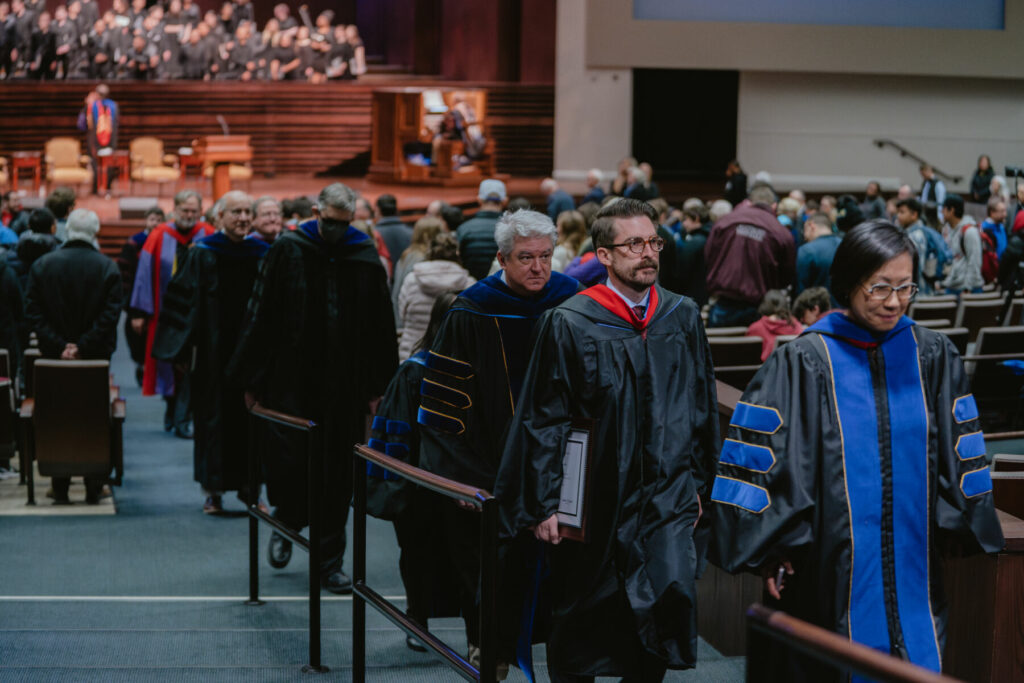
Lilly Park, associate professor of biblical counseling, Chandler Snyder, vice president for enrollment and student services and dean of students, and Michael Wilkinson, associate professor of theology and director of Professional Doctoral Programs, walk with the faculty of Southwestern Baptist Theological Seminary and Texas Baptist College following the Jan. 23 convocation service on the Fort Worth campus.
Dockery said when Southern Baptists adopted the first Baptist Faith and Message in 1925, the same year that Southwestern Seminary was received by the Southern Baptist Convention, the statement of faith was influenced by the New Hampshire Confession in that it “affirming inspired Scripture as truth, without any mixture of error” while simultaneously rejecting “the public advocacy of evolutionary thought” that was becoming prevalent across Baptist college campuses.
The second president of Southwestern Seminary, L.R. Scarborough, led the “Southwestern faculty at the time to adopt and affirm the new 1925 statement,” Dockery said, adding both the SBC and Southwestern adopted revisions of the Baptist Faith and Message in 1963 and 2000.
Noting that confessional statements are “providentially directed,” but “have certain limitations since they are human summaries of divine truth,” Dockery encouraged the seminary community to “affirm the importance of the confessional tradition and Southwestern’s genuine and renewed commitment to be a confessionally guided community, while acknowledging that we do not affirm the same level of authority for the confession that we do for the Holy Scripture. He added that “unlike the Bible, which affirms its own inspiration and truthfulness, the confession makes no claims to infallibility.”
Acknowledging the confessional statement is both “essential and necessary as a safeguard” that helps the seminary keep “Christ-centered, evangelical, orthodox, and Baptist commitments,” but by itself it is “no guarantee of such faithfulness,” Dockery said, adding that “confessions are essential and necessary, but not sufficient.” He said the confessionally guided core value “must be understood in light of our commitments to the other five core values.”
“We do not wish for this important core value and its commitment to engender some type of unwanted, rationalistic, legalism – falling short of a full-orbed Christian commitment,” Dockery explained. “Instead, what we want from this community is a voluntary, warm-hearted, wholehearted commitment to carry forth the essence of the Christian faith as it has been articulated through the years doing so together alongside of our Baptist distinctives.”
He added, “Let us all say together this morning as Southwestern, as a confessionally-guided community, that such liberal revisionism will not take place in this community on our watch.”
Dockery said the confessionally guided core value is “important” for five reasons. He said the value assists in the connection with the “Christian confessional tradition” and understanding the affirmation of the communion of saints; gives a “hermeneutical window” to Southwestern’s “scripturally-grounded commitments;” clarifies Baptist distinctives; helps balance the “mandates of right belief, right Christian thinking, and right Christian living;” and, lastly, supports correct thinking about how to bring the “Christian faith to bear upon our teaching, our learning, our in all aspects of our work across this community” especially as “we relate to one another in love.”
Dockery noted Southwestern is entering the 100th year of its official affiliation with the Southern Baptist Convention, having been received during the 1925 annual meeting, which also adopted the first Baptist Faith and Message statement and what became known as the Cooperative Program.
“Reflecting on these far-reaching decisions of the 1925 Convention remind those of us who serve here at Southwestern that our confessionally guided commitments are also connected to our commitments to the Southern Baptist Convention and to the spirit of cooperation,” he said.
Recognizing the various generational and cultural backgrounds of the Southwestern community, Dockery concluded, “One of the things that will evidence the depth and authenticity of our confessional commitments, as well as our attention that we can give toward one another is the way we live out the implications of this confession, each and every day, through our genuine love and respect for one another and the ways in which we serve together in harmony and heartfelt collaboration.”
Prior to Dockery’s convocation address, one new faculty member was welcomed, one faculty member was installed into an academic chair, and three administrators were installed into administrative roles.
Madison Grace II, provost and vice president for academic administration and dean of the School of Theology, introduced Kevin Rodgers, associate professor of intercultural studies at Texas Baptist College, the seminary’s undergraduate school. Rodgers, who serves with the International Mission Board (IMB), will be on campus in the fall.
Dockery led in the installations of one academic chair and three vice presidents.
Dean Sieberhagen, interim dean of the Roy J. Fish School of Evangelism and Missions, was installed in the Charles F. Stanley Chair for the Advancement of Global Christianity. Sieberhagen joined the Southwestern faculty in 2013 following more than a decade of service with the IMB.
Travis Trawick was installed as the vice president for institutional effectiveness and strategy. Trawick has served in various capacities at Southwestern since 2007 and has taught as assistant professor of theology in the School of Theology since 2021.
Adam Dodd, assistant professor of Old Testament and biblical backgrounds, was installed as vice president for campus technology. A three-time graduate of the Fort Worth institution, Dodd has served on Seminary Hill since 2010.
Chandler Snyder, who began serving at Southwestern in June 2022, was installed as vice president for enrollment and student services and dean of students. Snyder, who previously served with the IMB, is instructor of missions in the Fish School and is completing his Doctor of Philosophy degree at Southwestern.
Dockery’s entire message can be viewed here.
Chapel is held every Tuesday and Thursday morning at 10 a.m. (CT) in MacGorman Chapel on the campus of Southwestern Seminary and TBC. Chapel may be viewed live at swbts.live.
